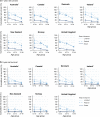Pancreatic cancer survival by stage and age in seven high-income countries (ICBP SURVMARK-2): a population-based study
- PMID: 35236937
- PMCID: PMC9174285
- DOI: 10.1038/s41416-022-01752-3
Pancreatic cancer survival by stage and age in seven high-income countries (ICBP SURVMARK-2): a population-based study
Abstract
Background: The global burden of pancreatic cancer has steadily increased, while the prognosis after pancreatic cancer diagnosis remains poor. This study aims to compare the stage- and age-specific pancreatic cancer net survival (NS) for seven high-income countries: Australia, Canada, Denmark, Ireland, New Zealand, Norway, and United Kingdom.
Methods: The study included over 35,000 pancreatic cancer cases diagnosed during 2012-2014, followed through 31 December 2015. The stage- and age-specific NS were calculated using the Pohar-Perme estimator.
Results: Pancreatic cancer survival estimates were low across all 7 countries, with 1-year NS ranging from 21.1% in New Zealand to 30.9% in Australia, and 3-year NS from 6.6% in the UK to 10.9% in Australia. Most pancreatic cancers were diagnosed with distant stage, ranging from 53.9% in Ireland to 83.3% in New Zealand. While survival differences were evident between countries across all stage categories at one year after diagnosis, this survival advantage diminished, particularly in cases with distant stage.
Conclusion: This study demonstrated the importance of stage and age at diagnosis in pancreatic cancer survival. Although progress has been made in improving pancreatic cancer prognosis, the disease is highly fatal and will remain so without major breakthroughs in the early diagnosis and management.
© 2022. The Author(s), under exclusive licence to Springer Nature Limited.
Conflict of interest statement
The authors declare no competing interests.
Figures



References
-
- International Agency for Research on Cancer. Global Cancer Observatory. http://gco.iarc.fr/ (2020).
-
- Global Burden of Disease Study (GBD) Pancreatic Cancer Collaborators. The global, regional, and national burden of pancreatic cancer and its attributable risk factors in 195 countries and territories, 1990–2017: a systematic analysis for the Global Burden of Disease Study 2017. Lancet Gastroenterol Hepatol. 2019;4:934–47. doi: 10.1016/S2468-1253(19)30347-4. - DOI - PMC - PubMed
-
- Arnold M, Rutherford MJ, Bardot A, Ferlay J, Andersson TM, Myklebust TA, et al. Progress in cancer survival, mortality, and incidence in seven high-income countries 1995–2014 (ICBP SURVMARK-2): a population-based study. Lancet Oncol. 2019;20:1493–505. doi: 10.1016/S1470-2045(19)30456-5. - DOI - PMC - PubMed
Publication types
MeSH terms
Grants and funding
LinkOut - more resources
Full Text Sources
Medical
Miscellaneous

